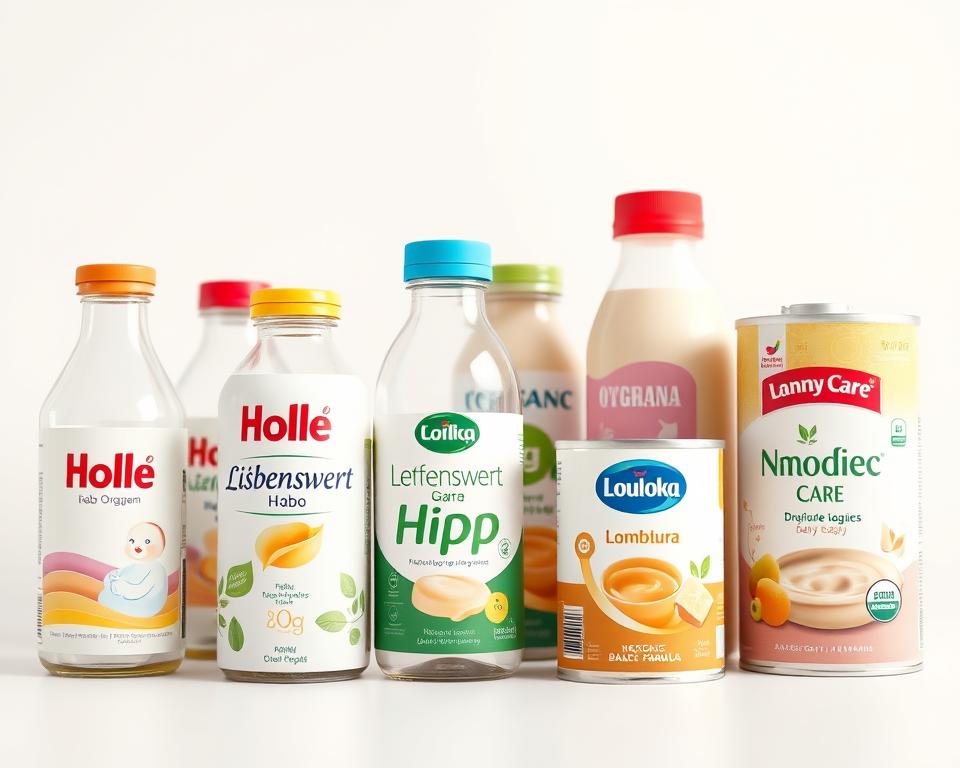Locate the Finest Organic Baby Formulas: Mom & Dad’s Manual
Nearly 80% of parents in the United States use baby formula at some point in their infant’s first year. This is often due to breastfeeding challenges. Picking the ideal Baby organics formula matters greatly to these parents. This resource supports parents in selecting top organic options for infant nutrition.
We will examine various formulas and brands, focusing on quality and nutrition. This information is vital for ensuring a healthy start for your child.
Choosing the right food for your baby is a critical decision for every parent. Formulas made from certified organic ingredients have surged in demand. It delivers a purer nutrition source. Organic products avoid synthetic pesticides and fertilizers, giving your little one a cleaner start.
Caregivers now prioritize non-GMO, additive-free options. These worries underscore why organic formulas are the preferred safe option.
Benefits of Organic Ingredients
Certified organic components deliver notable advantages. These ingredients are rigorously tested, ensuring higher quality and safety. By opting for organic infant formula, parents can rest assured that their child is consuming food free from harmful substances.
Organic farming methods champion eco-friendly and sustainable practices. This reinforces benefits that extend beyond dietary choices.
Associated Health Advantages
Organic nutrition often supports better infant growth outcomes. Evidence indicates organics can reduce digestive upset and allergy chances. This can be attributed to the pure formulation free from synthetic additives.
Moms and dads value how organics deliver complete nourishment. They bolster development and holistic infant health.

Key Features to Look for in Organic Baby Formula
Selecting premier organic infant formula matters dramatically for your child’s wellbeing. It’s important to consider the protein sources and the essential nutrients. How proteins are sourced and balanced impacts digestion and nourishment. Also, knowing the essential nutrients ensures your baby gets the best support for growth and development.
Whey vs. Casein Balance
Formulas typically blend whey with casein proteins. Whey digests readily; casein offers sustained nutrient delivery. More whey generally equals gentler digestion for infants. Organic brands usually prioritize elevated whey levels for ease of digestion. Choose products that specify their protein blend and proper proportions.
Essential Nutrients and Additives
It’s vital to consider the essential nutrients in infant formula for development. DHA and ARA are critical for brain and eye health. Prebiotics also play a role in digestive health and immune system strength. Look out for these components to secure complete nourishment. Organic formulas that focus on these nutrients offer a rich source of nutrition.
| Protein Source | Benefits | Whey-to-Casein Ratio |
|---|---|---|
| Whey | Easier digestibility|Gentle on tummies|Quick absorption | Higher ratio is better|Lean whey blend preferred|Above 60% ideal |
| Casein | Slow release of nutrients|Sustained nourishment|Stomach-friendly over time | Lower ratio preferred in early months|Casein kept minimal|Around 40% or less |
Top-Rated Organic Formula Brands
Parents seeking the best organic baby formula often turn to trusted brands known for quality. Let’s explore some top choices, highlighting their unique features and standout qualities. Leaders in USDA-certified organics, they meet distinct caregiver expectations.
Kendamil’s Creamy Whole Milk Blend
As the sole whole-milk organic formula, Kendamil stands out. Enjoy its luscious consistency free from unwanted chemicals. Caregivers favor it for its simple, clean ingredients. You can easily purchase Kendamil with a few clicks.
HiPP’s Combiotik for Delicate Digestions
Designed to soothe, Combiotik suits babies with sensitive guts. Combines prebiotic fibers and live cultures to aid gut health. Parents often choose HiPP for its commitment to organic, high-quality ingredients, making it a favorite in organic baby food shops.
Holle’s Biodynamic Organic Formula
Holle Bio is renowned for its biodynamic farming practices, providing premium certified organic formula. Renowned for exacting standards and green principles. Parents trust Holle for its authentic taste and nutrition.
Aussie Bubs Grass-Fed Blend
By sourcing from grass-fed herds, Aussie Bubs maximizes nutrient density. All components reflect a back-to-nature approach. Its grass-fed pedigree signals high standards to parents.
Bobbie’s Contemporary Organic Blend
Leading-edge and organic, Bobbie sets new standards. Balances modern nutrition science with certified organics. Parents value Bobbie’s nutritional approach as they navigate baby feeding.
Choosing the right organic formula for your baby requires careful thought about their dietary needs. Recognizing food sensitivities helps you avoid tummy troubles. Component choices matter for infants prone to digestive issues.
Assessing Dietary Sensitivities
Some babies show intolerance to specific proteins or sugars. Opt for specialized organic blends that address these issues. Sensitive blends reduce lactose or include pre-broken down proteins. These features aim to reduce irritation and aid in digestive health.
Talk with your child’s doctor before switching formulas.
Considering Digestive Comfort
Digestive comfort is essential for infants, and the right organic formula is key. These compounds encourage a healthy microbiome and smoother digestion. By fostering beneficial bacteria, they enhance absorption and gut health.
For parents looking for the best organic formula for breastfed babies, many options offer essential nutrients.
Steps to Switch to Organic Formula
Moving to organics from breast milk or conventional formula works best with steady changes. It’s important to understand how to transition your baby to formula for both your comfort and theirs. Slowly shifting ratios eases acceptance and prevents distress.
Phased Introduction
Begin with small amounts of organics mixed in. Here are some effective steps for a seamless transition:
- Begin with a mix of your current formula and organic baby formula, using a ratio of about 25% organic to 75% traditional formula.
- Slowly tilt the balance until you reach 100% organic.
- If distress appears, reduce the organic increment and proceed more slowly.
- Serve the new formula during calm periods so baby links it with comfort.
- Keep consistent feeding times to support the changeover.
Positive Transition Signals
Spotting these indicators confirms a smooth adaptation:
- Baby nurses or bottles quietly and contentedly.
- Normal poops and easy digestion continue.
- No significant changes in appetite or feeding patterns.
- Baby smiles and rests peacefully after meals.
Patience pays off—look for these signs for a favorable outcome.
Comparing Organic and Regular Custom Formulas
Caregivers often debate organics versus conventional formula for baby’s diet. Making the right pick ensures optimal nutrition for little ones. Concern over pure components and wellness perks drives the decision.
Ingredient Differences
Ingredient lists mark the key divergence between organics and regular formulas. Organics rely on farm-fresh ingredients without synthetic extras. Labels such as HiPP and Kendamil source from eco-friendly dairies. On the other hand, traditional formulas might include synthetic nutrients or non-organic ingredients. This highlights the organic formulas’ focus on natural, wholesome nutrition.
Cost Comparison
Cost tends to be higher for organics due to rigorous sourcing requirements. Certification and sustainable farming drive up the price tag on organics. Despite the higher cost, many parents see the health benefits as worth the investment. Assessing cost versus benefit guides a balanced purchasing decision.
E-commerce platforms now simplify organic formula shopping. You can shop for the best organics without leaving your house. It enables discovery of specialty formulas for different needs.
Benefits of Online Shopping
Online shopping brings numerous benefits for parents with hectic schedules. Convenience: Order from anywhere without the need to visit a store.
- Time-saving ordering
- Variety: Explore an extensive selection of organic baby formulas across different brands
- Online deals and sales help reduce costs
Formula Subscription Benefits
Subscription models now dominate formula provisioning. Automated orders keep your formula supply constant.
Key features of infant formula subscriptions include:
- Automatic Deliveries: Ensure a steady supply of formula without the hassle of reordering
- Customizable Frequency: Choose how often to receive deliveries based on your family’s needs
- Cost Savings: Many subscription services offer discounts compared to one-time purchases
Regulatory Standards for Organic Baby Formulas
Guaranteeing formula purity demands robust regulation. It involves a detailed framework of regulatory standards. FDA mandates safeguard formula nutrient profiles and hygiene. Organic labels backed by USDA verify farm-to-formula purity. Knowing compliance details aids in making the best decisions.
Federal Formula Guidelines
The FDA is instrumental in regulating the infant formula market in the U.S. They mandate specific vitamin, mineral, and protein levels plus allowable additives. This ensures that each formula meets the nutritional needs of a growing baby. Key aspects include:
- Mandatory ingredient listings|Required ingredient disclosures|Compulsory component labeling
- Specific nutrient requirements such as protein, fats, and vitamins|Defined macro- and micronutrient thresholds|Preset nutrition minimums
- Comprehensive quality control measures during manufacturing|Rigorous production inspections|Stringent safety checks
Adherence to these FDA regulations guarantees that only safe, nutritionally adequate products are available.
USDA Organic Certification Guidelines
USDA organics seals mark trusted formula authenticity. The certification process involves several essential criteria. Key criteria include:
- Proof that ingredients are produced without synthetic fertilizers or pesticides|No chemical fertilizers or sprays used|Farm inputs must be 100% natural
- Verification of non-GMO (genetically modified organism) status|Guarantee of GMO-free sourcing|Strict non-GMO testing
- Clear guidelines on the handling and processing of organic products|Protected organic integrity during production|Certified organic processing rules
USDA label confirms field-to-formula organics. It secures a cleaner start for baby nutrition. Together, these frameworks give caregivers full assurance.
| Regulatory Aspect | Description |
|---|---|
| FDA Regulations | Sets safety and nutrient standards for infant formula |
| USDA Organic Certification | Ensures organic ingredients are grown without harmful substances |
| Quality Control | Mandatory checks during production processes |
| Ingredient Transparency | Clear labeling of all components for consumer knowledge |
Tips for Buying Organic Baby Formula
Choosing the right organic baby formula can seem daunting. Yet, armed with smart strategies, selection becomes simple. Being aware of sources and certifications eases the purchase.
Best E-Tailers for Organic Formula
Multiple web shops carry extensive organic formula lines. They often have competitive prices. Here are some top choices:
- Amazon – Renowned for choice and quick dispatch
- Target – Features same-day delivery and curbside pickup
- Walmart – Provides both online shopping and local availability
- Thrive Market – Specializes in natural and organic groceries
Review shopper comments for real-world insights. Use reviews to judge formula performance and vendor service.
Certification Guide
Interpreting certifications prevents misinformed purchases. Seek official seals verifying organic compliance. Typical certifications are:
| Certification | Description |
|---|---|
| USDA Organic | Indicates the formula contains at least 95% organic ingredients |
| Non-GMO Project Verified | Means the formula does not use genetically modified organisms |
| European Union Organic | Denotes adherence to EU organic farming regulations |
Identifying labels confirms both safety and quality.
Final Thoughts
As we conclude this organic baby formula overview, it’s evident that selecting the right formula is critical for your baby’s health. Organic baby food offers more than just ingredients; it ensures your child’s overall well being. Your baby receives balanced nourishment free from chemicals. Parents have discovered key factors to consider, such as protein sources, dietary sensitivities, and the reputation of brands like Kendamil, HiPP Combiotik, and Holle Bio.
We emphasized matching formula to individual infant requirements. Transitioning to organic options should be a careful process. Slow steps keep baby happy and well.
By considering the discussed tips and features, parents can make informed decisions among the vast market options. Opting for organic feeding fosters lifelong nutritional good habits. Keep championing top-tier infant nutrition. Ensure every tiny step toward solid foods starts with safe, wholesome options.


